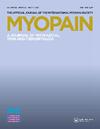Fibromyalgia Syndrome Review
引用次数: 0
Abstract
Although patients with fibromyalgia syndrome [FMS] often report that specific weather conditions aggravate their symptoms, empirical studies have not conclusively demonstrated such a relationship. The aim of this group was to examine the association between weather conditions and daily symptoms of pain and fatigue in FMS, and to identify patient characteristics explaining individual differences in weather sensitivity. Female patients with FMS [n1⁄4 333, mean age 47.0 years, mean time since diagnosis 3.5 years] completed questions on pain and fatigue on 28 consecutive days. Daily weather conditions, including air temperature, sunshine duration, precipitation, atmospheric pressure, and relative humidity, were obtained from the Royal Netherlands Meteorological Institute. Multilevel regression analysis was applied. In five [10%] of 50 analyses, weather variables showed a significant but small effect on either pain or fatigue. In 10 analyses [20%], significant, small differences between patients were observed in the random effects of the weather variables, suggesting that symptoms of patients were, to a small extent, differentially affected by some weather conditions, for example, high pain with either low or high atmospheric pressure. These individual differences were explained neither by demographic, functional, or mental patient characteristics, nor by season or weather variation during the assessment period. The authors conclude, that there is more evidence against than in support of a uniform influence of weather on daily pain and fatigue in female patients with FMS. Although individuals appear to be differentially sensitive to certain weather conditions, there is no indication that specific patient characteristics play a role in weather sensitivity.纤维肌痛综合征综述
虽然纤维肌痛综合征(FMS)患者经常报告说,特定的天气条件加重了他们的症状,但实证研究并没有结论性地证明这种关系。本小组的目的是研究天气状况与FMS患者的日常疼痛和疲劳症状之间的关系,并确定患者特征,解释天气敏感性的个体差异。女性FMS患者[n1 / 4 333,平均年龄47.0岁,平均诊断后时间3.5年]连续28天完成疼痛和疲劳问题。每天的天气状况,包括气温、日照时间、降水、大气压力和相对湿度,都是从荷兰皇家气象研究所获得的。采用多水平回归分析。在50项分析中的5项(10%)中,天气变量显示对疼痛或疲劳有显著但很小的影响。在10项分析[20%]中,观察到患者之间在天气变量的随机效应方面存在显着的微小差异,这表明患者的症状在很小程度上受到某些天气条件的差异影响,例如,低气压或高气压下的高疼痛。这些个体差异既不能用人口统计学、功能或精神患者特征来解释,也不能用评估期间的季节或天气变化来解释。作者的结论是,有更多的证据表明天气对女性FMS患者的日常疼痛和疲劳有统一的影响,而不是支持。虽然个体对某些天气条件的敏感性不同,但没有迹象表明特定的患者特征在天气敏感性中起作用。
本文章由计算机程序翻译,如有差异,请以英文原文为准。
求助全文
约1分钟内获得全文
求助全文

 求助内容:
求助内容: 应助结果提醒方式:
应助结果提醒方式:


